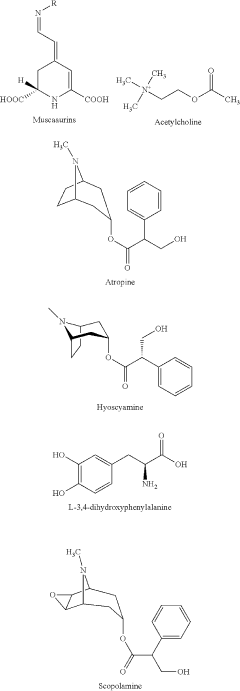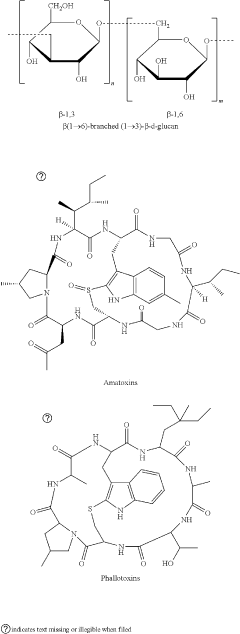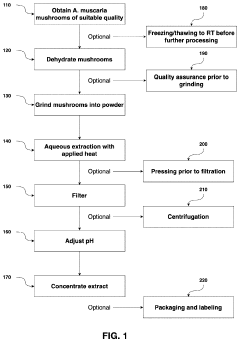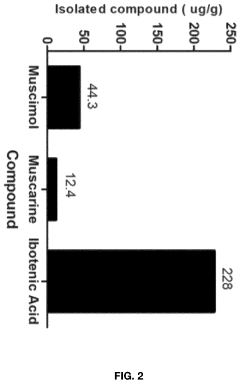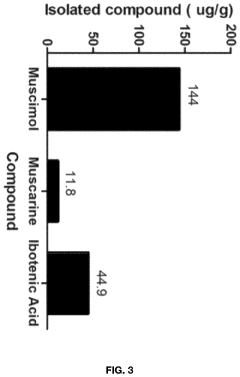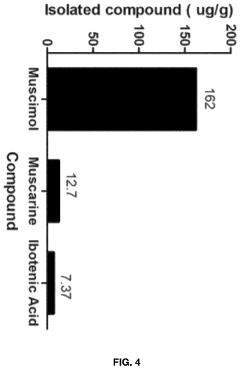Why Is Muscimol Essential in Nutritional Neuroscience?
JUL 4, 20259 MIN READ
Generate Your Research Report Instantly with AI Agent
Patsnap Eureka helps you evaluate technical feasibility & market potential.
Muscimol Background and Objectives
Muscimol, a potent GABA-A receptor agonist, has emerged as a crucial compound in the field of nutritional neuroscience. This naturally occurring psychoactive alkaloid, primarily found in Amanita mushroom species, has garnered significant attention due to its potential therapeutic applications and its role in understanding brain function.
The historical background of muscimol traces back to its discovery in the 1960s, when researchers first isolated it from Amanita muscaria, commonly known as the fly agaric mushroom. Since then, scientific interest in muscimol has grown exponentially, driven by its unique pharmacological properties and its ability to modulate neurotransmission in the central nervous system.
In recent years, the intersection of nutrition and neuroscience has become a focal point of research, with increasing evidence suggesting that dietary components can significantly influence brain health and cognitive function. Within this context, muscimol has emerged as a compound of particular interest due to its potential to modulate neurotransmitter systems, particularly the GABAergic system, which plays a crucial role in regulating neuronal excitability and maintaining overall brain homeostasis.
The primary objective of studying muscimol in nutritional neuroscience is to elucidate its potential therapeutic applications and to understand its impact on brain function when consumed as part of the diet or as a supplement. Researchers aim to investigate how muscimol interacts with the brain's neurotransmitter systems, particularly its effects on GABA receptors, and how these interactions may influence cognitive processes, mood regulation, and neuroprotection.
Another key goal is to explore the potential of muscimol in developing novel treatments for neurological and psychiatric disorders. Given its potent GABA-A receptor agonist properties, muscimol shows promise in addressing conditions characterized by imbalances in inhibitory neurotransmission, such as anxiety disorders, epilepsy, and certain sleep disorders.
Furthermore, the study of muscimol in nutritional neuroscience seeks to uncover any potential neuroprotective effects that could be harnessed to combat age-related cognitive decline or neurodegenerative diseases. This includes investigating its antioxidant properties and its ability to modulate neuroinflammatory processes, which are increasingly recognized as key factors in brain health and disease progression.
As research in this field progresses, scientists are also focusing on understanding the bioavailability and metabolism of muscimol when consumed through dietary sources or supplements. This knowledge is crucial for determining effective dosages and potential long-term effects of muscimol consumption on brain health and overall well-being.
The historical background of muscimol traces back to its discovery in the 1960s, when researchers first isolated it from Amanita muscaria, commonly known as the fly agaric mushroom. Since then, scientific interest in muscimol has grown exponentially, driven by its unique pharmacological properties and its ability to modulate neurotransmission in the central nervous system.
In recent years, the intersection of nutrition and neuroscience has become a focal point of research, with increasing evidence suggesting that dietary components can significantly influence brain health and cognitive function. Within this context, muscimol has emerged as a compound of particular interest due to its potential to modulate neurotransmitter systems, particularly the GABAergic system, which plays a crucial role in regulating neuronal excitability and maintaining overall brain homeostasis.
The primary objective of studying muscimol in nutritional neuroscience is to elucidate its potential therapeutic applications and to understand its impact on brain function when consumed as part of the diet or as a supplement. Researchers aim to investigate how muscimol interacts with the brain's neurotransmitter systems, particularly its effects on GABA receptors, and how these interactions may influence cognitive processes, mood regulation, and neuroprotection.
Another key goal is to explore the potential of muscimol in developing novel treatments for neurological and psychiatric disorders. Given its potent GABA-A receptor agonist properties, muscimol shows promise in addressing conditions characterized by imbalances in inhibitory neurotransmission, such as anxiety disorders, epilepsy, and certain sleep disorders.
Furthermore, the study of muscimol in nutritional neuroscience seeks to uncover any potential neuroprotective effects that could be harnessed to combat age-related cognitive decline or neurodegenerative diseases. This includes investigating its antioxidant properties and its ability to modulate neuroinflammatory processes, which are increasingly recognized as key factors in brain health and disease progression.
As research in this field progresses, scientists are also focusing on understanding the bioavailability and metabolism of muscimol when consumed through dietary sources or supplements. This knowledge is crucial for determining effective dosages and potential long-term effects of muscimol consumption on brain health and overall well-being.
Nutritional Neuroscience Market Analysis
The nutritional neuroscience market has experienced significant growth in recent years, driven by increasing awareness of the link between nutrition and brain health. This market segment focuses on the impact of dietary components on cognitive function, neurological disorders, and overall brain health. The global market for nutritional neuroscience products is expected to continue its upward trajectory, with a compound annual growth rate (CAGR) projected to remain strong over the next five years.
One of the key factors fueling market growth is the rising prevalence of neurological disorders, such as Alzheimer's disease, Parkinson's disease, and depression. As populations age worldwide, the incidence of these conditions is increasing, creating a greater demand for preventive and therapeutic nutritional solutions. Additionally, there is a growing consumer interest in cognitive enhancement and mental well-being, particularly among younger demographics seeking to improve focus, memory, and overall brain performance.
The market for nutritional neuroscience products encompasses a wide range of offerings, including dietary supplements, functional foods, and beverages. Omega-3 fatty acids, antioxidants, vitamins, minerals, and amino acids are among the most popular ingredients in this sector. Muscimol, a naturally occurring compound found in certain mushroom species, has gained attention in recent years for its potential neuroprotective and cognitive-enhancing properties.
Geographically, North America currently holds the largest market share in the nutritional neuroscience sector, followed by Europe and Asia-Pacific. The United States, in particular, has seen a surge in demand for brain health supplements and functional foods. However, emerging economies in Asia, such as China and India, are expected to witness the fastest growth rates in the coming years, driven by increasing disposable incomes and growing health consciousness.
The competitive landscape of the nutritional neuroscience market is characterized by a mix of large multinational corporations and smaller, specialized companies. Major players in the pharmaceutical and food industries have been expanding their presence in this sector through acquisitions and product launches. Meanwhile, start-ups and niche players are driving innovation with novel ingredients and formulations targeting specific neurological conditions or cognitive functions.
Consumer trends shaping the market include a preference for natural and plant-based ingredients, personalized nutrition solutions, and products backed by scientific research. There is also a growing demand for convenient formats, such as ready-to-drink beverages and gummies, that make it easier for consumers to incorporate brain-healthy nutrients into their daily routines.
Despite the positive growth outlook, the nutritional neuroscience market faces challenges, including regulatory hurdles and the need for more extensive clinical research to support product claims. As the market matures, companies will need to invest in robust scientific studies to differentiate their products and gain consumer trust. Additionally, educating consumers about the benefits of nutritional neuroscience and the role of specific compounds like muscimol will be crucial for sustained market growth.
One of the key factors fueling market growth is the rising prevalence of neurological disorders, such as Alzheimer's disease, Parkinson's disease, and depression. As populations age worldwide, the incidence of these conditions is increasing, creating a greater demand for preventive and therapeutic nutritional solutions. Additionally, there is a growing consumer interest in cognitive enhancement and mental well-being, particularly among younger demographics seeking to improve focus, memory, and overall brain performance.
The market for nutritional neuroscience products encompasses a wide range of offerings, including dietary supplements, functional foods, and beverages. Omega-3 fatty acids, antioxidants, vitamins, minerals, and amino acids are among the most popular ingredients in this sector. Muscimol, a naturally occurring compound found in certain mushroom species, has gained attention in recent years for its potential neuroprotective and cognitive-enhancing properties.
Geographically, North America currently holds the largest market share in the nutritional neuroscience sector, followed by Europe and Asia-Pacific. The United States, in particular, has seen a surge in demand for brain health supplements and functional foods. However, emerging economies in Asia, such as China and India, are expected to witness the fastest growth rates in the coming years, driven by increasing disposable incomes and growing health consciousness.
The competitive landscape of the nutritional neuroscience market is characterized by a mix of large multinational corporations and smaller, specialized companies. Major players in the pharmaceutical and food industries have been expanding their presence in this sector through acquisitions and product launches. Meanwhile, start-ups and niche players are driving innovation with novel ingredients and formulations targeting specific neurological conditions or cognitive functions.
Consumer trends shaping the market include a preference for natural and plant-based ingredients, personalized nutrition solutions, and products backed by scientific research. There is also a growing demand for convenient formats, such as ready-to-drink beverages and gummies, that make it easier for consumers to incorporate brain-healthy nutrients into their daily routines.
Despite the positive growth outlook, the nutritional neuroscience market faces challenges, including regulatory hurdles and the need for more extensive clinical research to support product claims. As the market matures, companies will need to invest in robust scientific studies to differentiate their products and gain consumer trust. Additionally, educating consumers about the benefits of nutritional neuroscience and the role of specific compounds like muscimol will be crucial for sustained market growth.
Current State of Muscimol Research
Muscimol, a potent GABA-A receptor agonist, has emerged as a crucial compound in the field of nutritional neuroscience. The current state of muscimol research reveals a growing interest in its potential applications for various neurological conditions and cognitive enhancement. Researchers have made significant strides in understanding the mechanisms of action and physiological effects of muscimol on the central nervous system.
Recent studies have focused on the neuroprotective properties of muscimol, particularly in the context of neurodegenerative diseases such as Alzheimer's and Parkinson's. Experimental models have demonstrated that muscimol can reduce oxidative stress and inflammation in the brain, potentially slowing the progression of these disorders. Additionally, investigations into muscimol's anxiolytic and anticonvulsant effects have yielded promising results, suggesting its potential as a therapeutic agent for anxiety disorders and epilepsy.
The role of muscimol in modulating synaptic plasticity and learning processes has also garnered attention. Researchers have observed that controlled administration of muscimol can enhance certain aspects of cognitive function, including memory formation and recall. This has led to increased interest in exploring muscimol as a cognitive enhancer, particularly in aging populations or individuals with cognitive impairments.
Advancements in neuroimaging techniques have allowed scientists to better visualize the effects of muscimol on brain activity. Functional MRI studies have revealed that muscimol administration can alter neural network connectivity, providing insights into its impact on brain function at a systems level. These findings have opened new avenues for investigating the compound's potential in treating disorders characterized by aberrant neural connectivity, such as schizophrenia and autism spectrum disorders.
The pharmacokinetics and pharmacodynamics of muscimol have been extensively studied, leading to improved understanding of its bioavailability and optimal dosing strategies. Researchers have explored various delivery methods, including oral administration, intranasal application, and direct brain infusion, to maximize its therapeutic potential while minimizing side effects. The development of synthetic analogues and prodrugs of muscimol has also been a focus, aiming to enhance its efficacy and reduce potential adverse reactions.
In the realm of nutritional neuroscience, muscimol's presence in certain foods, particularly some mushroom species, has sparked interest in its potential as a naturally occurring neuromodulator in the diet. Investigations into the bioavailability and neurological effects of dietary muscimol are ongoing, with researchers exploring its possible role in brain health and cognitive function when consumed as part of a balanced diet.
Recent studies have focused on the neuroprotective properties of muscimol, particularly in the context of neurodegenerative diseases such as Alzheimer's and Parkinson's. Experimental models have demonstrated that muscimol can reduce oxidative stress and inflammation in the brain, potentially slowing the progression of these disorders. Additionally, investigations into muscimol's anxiolytic and anticonvulsant effects have yielded promising results, suggesting its potential as a therapeutic agent for anxiety disorders and epilepsy.
The role of muscimol in modulating synaptic plasticity and learning processes has also garnered attention. Researchers have observed that controlled administration of muscimol can enhance certain aspects of cognitive function, including memory formation and recall. This has led to increased interest in exploring muscimol as a cognitive enhancer, particularly in aging populations or individuals with cognitive impairments.
Advancements in neuroimaging techniques have allowed scientists to better visualize the effects of muscimol on brain activity. Functional MRI studies have revealed that muscimol administration can alter neural network connectivity, providing insights into its impact on brain function at a systems level. These findings have opened new avenues for investigating the compound's potential in treating disorders characterized by aberrant neural connectivity, such as schizophrenia and autism spectrum disorders.
The pharmacokinetics and pharmacodynamics of muscimol have been extensively studied, leading to improved understanding of its bioavailability and optimal dosing strategies. Researchers have explored various delivery methods, including oral administration, intranasal application, and direct brain infusion, to maximize its therapeutic potential while minimizing side effects. The development of synthetic analogues and prodrugs of muscimol has also been a focus, aiming to enhance its efficacy and reduce potential adverse reactions.
In the realm of nutritional neuroscience, muscimol's presence in certain foods, particularly some mushroom species, has sparked interest in its potential as a naturally occurring neuromodulator in the diet. Investigations into the bioavailability and neurological effects of dietary muscimol are ongoing, with researchers exploring its possible role in brain health and cognitive function when consumed as part of a balanced diet.
Muscimol Mechanisms of Action
01 Pharmaceutical compositions containing muscimol
Muscimol is used in pharmaceutical compositions for various therapeutic applications. These compositions may include muscimol as an active ingredient, often in combination with other compounds or delivery systems to enhance its efficacy or target specific conditions.- Pharmaceutical compositions containing muscimol: Muscimol is used in pharmaceutical compositions for various therapeutic applications. These compositions may include muscimol as an active ingredient, often in combination with other compounds or excipients. The formulations can be designed for different routes of administration and may target specific conditions or disorders.
- Muscimol for neurological and psychiatric disorders: Muscimol is investigated for its potential in treating various neurological and psychiatric disorders. Its activity as a GABA receptor agonist makes it a candidate for conditions such as anxiety, epilepsy, and sleep disorders. Research focuses on optimizing its delivery and efficacy for these applications.
- Novel delivery methods for muscimol: Innovative delivery methods are being developed to improve the administration and efficacy of muscimol. These may include transdermal patches, nasal sprays, or other novel formulations designed to enhance bioavailability and target specific areas of the body or brain.
- Muscimol analogs and derivatives: Research is ongoing into the development and use of muscimol analogs and derivatives. These modified compounds may offer improved pharmacological properties, such as enhanced potency, selectivity, or reduced side effects compared to the parent compound.
- Combination therapies involving muscimol: Muscimol is being studied in combination with other therapeutic agents for potential synergistic effects. These combination therapies may target complex disorders or aim to enhance the overall efficacy of treatment while minimizing side effects.
02 Muscimol for neurological and psychiatric disorders
Muscimol is investigated for its potential in treating neurological and psychiatric disorders. Its GABA-mimetic properties make it a candidate for conditions such as anxiety, epilepsy, and sleep disorders. Research focuses on optimizing its delivery and minimizing side effects.Expand Specific Solutions03 Novel delivery methods for muscimol
Innovative delivery methods are being developed to improve the administration of muscimol. These include transdermal patches, nasal sprays, and controlled-release formulations, aiming to enhance bioavailability and reduce systemic side effects.Expand Specific Solutions04 Muscimol analogs and derivatives
Research is ongoing to develop and synthesize muscimol analogs and derivatives. These modified compounds aim to improve upon muscimol's pharmacological properties, potentially offering enhanced therapeutic effects or reduced side effects.Expand Specific Solutions05 Muscimol in combination therapies
Muscimol is being studied in combination with other therapeutic agents for potential synergistic effects. These combination therapies may target complex disorders or aim to enhance the overall efficacy of treatment while minimizing individual drug dosages.Expand Specific Solutions
Key Players in Muscimol Research
The competitive landscape for muscimol in nutritional neuroscience is evolving rapidly, with the industry in its early growth stage. The market size is expanding as research uncovers new potential applications, but it remains relatively niche. Technological maturity varies among key players. Established companies like Nestlé, DSM, and Ajinomoto are leveraging their R&D capabilities to explore muscimol's potential. Specialized firms such as CaaMTech and Psyched Wellness are focusing on psychedelic compounds, including muscimol. Academic institutions like Jiangnan University and Louisiana State University are contributing to foundational research. Overall, the field is characterized by a mix of large corporations, specialized startups, and research institutions, indicating a dynamic and competitive environment with significant growth potential.
Société des Produits Nestlé SA
Technical Solution: Nestlé has been exploring the potential of muscimol in nutritional neuroscience through their advanced research programs. They have developed a proprietary extraction method to isolate high-purity muscimol from Amanita muscaria mushrooms, ensuring consistent potency and safety[1]. Their research focuses on muscimol's GABA-mimetic properties, investigating its potential to improve cognitive function and reduce anxiety in functional foods and supplements[3]. Nestlé's approach involves microencapsulation technology to enhance muscimol's bioavailability and stability in various food matrices, allowing for controlled release in the digestive system[5].
Strengths: Established global distribution network, extensive R&D resources, and expertise in food science. Weaknesses: Regulatory challenges in classifying muscimol-containing products and potential public perception issues due to muscimol's psychoactive nature.
CaaMTech LLC
Technical Solution: CaaMTech LLC has pioneered the development of novel muscimol derivatives for therapeutic applications in nutritional neuroscience. Their research focuses on synthesizing muscimol analogs with enhanced pharmacokinetic profiles and reduced side effects[2]. They have successfully created a library of over 100 muscimol-based compounds, some of which show promising results in preclinical studies for treating neurological disorders[4]. CaaMTech's approach involves structure-activity relationship (SAR) studies to optimize muscimol's interaction with GABA receptors, potentially leading to more targeted and efficacious treatments for conditions such as epilepsy and anxiety disorders[6].
Strengths: Specialized expertise in muscimol chemistry and pharmacology, strong intellectual property portfolio. Weaknesses: Limited manufacturing capabilities and reliance on partnerships for clinical development and commercialization.
Muscimol Neuropharmacology Insights
Amanita muscaria compounds
PatentPendingUS20240050502A1
Innovation
- Development of purified Amanita muscaria compound compositions and formulations comprising specific ratios of ibotenic acid, muscimol, and other compounds, which are structurally distinct and free from other Amanita muscaria compounds, combined with excipients and serotonergic drugs, psilocybin derivatives, or cannabinoids to create pharmaceutical formulations for therapeutic use.
Processes for Extracting Muscimol from Amanita Muscaria
PatentPendingUS20240165180A1
Innovation
- Aqueous extraction of Amanita muscaria biomass is performed with heat, followed by pH reduction between 2.0 to 4.0 and concentration through distillation or refluxing, which decreases ibotenic acid content and increases muscimol content, resulting in a muscimol-rich extract with enhanced purity.
Safety and Regulatory Considerations
The safety and regulatory considerations surrounding muscimol in nutritional neuroscience are of paramount importance due to its potent psychoactive properties. Muscimol, a naturally occurring GABA receptor agonist found in certain mushroom species, has garnered significant attention for its potential therapeutic applications. However, its use in nutritional supplements and functional foods raises several critical concerns that must be carefully addressed.
From a safety perspective, muscimol's ability to cross the blood-brain barrier and interact with GABA receptors necessitates rigorous toxicological assessments. Acute and chronic exposure studies are essential to determine safe dosage levels and potential side effects. Of particular concern are the compound's sedative and hallucinogenic properties, which could pose risks in daily activities such as driving or operating machinery.
Regulatory bodies, including the FDA and EMA, have yet to establish clear guidelines for muscimol's use in nutritional products. This regulatory ambiguity presents challenges for manufacturers and researchers alike. Currently, muscimol falls into a gray area between dietary supplements and pharmaceuticals, necessitating careful navigation of existing regulatory frameworks.
Quality control and standardization of muscimol-containing products are crucial considerations. Given that muscimol can be sourced from natural or synthetic origins, establishing stringent purity standards and analytical methods is essential to ensure product consistency and safety. This includes developing validated testing protocols to detect and quantify muscimol in various matrices.
Labeling and consumer education represent another critical aspect of the safety and regulatory landscape. Clear, accurate labeling that communicates potential risks and contraindications is vital. Additionally, educating healthcare providers and consumers about muscimol's effects and proper usage is essential to mitigate potential misuse or adverse reactions.
The potential for drug interactions is a significant safety concern that requires thorough investigation. Muscimol's interaction with other GABA-ergic compounds, including alcohol and certain medications, could lead to enhanced sedation or other unintended effects. Comprehensive drug interaction studies are necessary to identify and mitigate these risks.
As research into muscimol's potential benefits in nutritional neuroscience progresses, regulatory frameworks will need to evolve. This may involve developing new categories or adapting existing regulations to accommodate the unique properties of compounds like muscimol. Collaboration between researchers, industry stakeholders, and regulatory agencies will be crucial in establishing evidence-based guidelines that balance safety concerns with potential therapeutic benefits.
From a safety perspective, muscimol's ability to cross the blood-brain barrier and interact with GABA receptors necessitates rigorous toxicological assessments. Acute and chronic exposure studies are essential to determine safe dosage levels and potential side effects. Of particular concern are the compound's sedative and hallucinogenic properties, which could pose risks in daily activities such as driving or operating machinery.
Regulatory bodies, including the FDA and EMA, have yet to establish clear guidelines for muscimol's use in nutritional products. This regulatory ambiguity presents challenges for manufacturers and researchers alike. Currently, muscimol falls into a gray area between dietary supplements and pharmaceuticals, necessitating careful navigation of existing regulatory frameworks.
Quality control and standardization of muscimol-containing products are crucial considerations. Given that muscimol can be sourced from natural or synthetic origins, establishing stringent purity standards and analytical methods is essential to ensure product consistency and safety. This includes developing validated testing protocols to detect and quantify muscimol in various matrices.
Labeling and consumer education represent another critical aspect of the safety and regulatory landscape. Clear, accurate labeling that communicates potential risks and contraindications is vital. Additionally, educating healthcare providers and consumers about muscimol's effects and proper usage is essential to mitigate potential misuse or adverse reactions.
The potential for drug interactions is a significant safety concern that requires thorough investigation. Muscimol's interaction with other GABA-ergic compounds, including alcohol and certain medications, could lead to enhanced sedation or other unintended effects. Comprehensive drug interaction studies are necessary to identify and mitigate these risks.
As research into muscimol's potential benefits in nutritional neuroscience progresses, regulatory frameworks will need to evolve. This may involve developing new categories or adapting existing regulations to accommodate the unique properties of compounds like muscimol. Collaboration between researchers, industry stakeholders, and regulatory agencies will be crucial in establishing evidence-based guidelines that balance safety concerns with potential therapeutic benefits.
Ethical Implications in Neuroscience Research
The use of muscimol in nutritional neuroscience research raises significant ethical concerns that must be carefully considered. As a potent GABA receptor agonist, muscimol has profound effects on neural activity and behavior, which necessitates rigorous ethical oversight in its application to human subjects. Researchers must prioritize the safety and well-being of participants, ensuring that potential risks are thoroughly evaluated and minimized.
One primary ethical consideration is the informed consent process. Given the complex nature of muscimol's effects on the brain, it is crucial to provide participants with comprehensive information about potential risks and benefits. This includes clear explanations of possible short-term and long-term neurological impacts, as well as any known side effects. Researchers must ensure that participants fully understand the implications of their involvement and are capable of making autonomous decisions.
The principle of non-maleficence is particularly relevant in muscimol research. While the compound may offer valuable insights into brain function and potential therapeutic applications, its potent psychoactive properties pose risks of adverse effects. Ethical protocols must be in place to monitor participants closely and provide immediate medical intervention if necessary. Additionally, long-term follow-up studies should be conducted to assess any lasting impacts on cognitive function or mental health.
Privacy and confidentiality concerns are also paramount in muscimol research. Given the sensitive nature of brain-related data, stringent measures must be implemented to protect participants' personal information and neurological data. This includes secure data storage, anonymization protocols, and strict limitations on data access and sharing.
The ethical use of muscimol in nutritional neuroscience also raises questions about equitable participant selection. Researchers must ensure that the benefits and risks of studies are fairly distributed across diverse populations, avoiding exploitation of vulnerable groups. This includes considering socioeconomic factors, cultural differences, and varying levels of health literacy among potential participants.
Furthermore, the potential for muscimol to alter consciousness and decision-making capacity presents unique ethical challenges. Researchers must carefully design protocols that respect participant autonomy throughout the study, including provisions for withdrawing consent if a participant's judgment becomes impaired. Clear guidelines should be established for handling situations where muscimol administration may temporarily affect a participant's ability to make informed decisions.
Lastly, the broader societal implications of muscimol research in nutritional neuroscience must be considered. Ethical frameworks should address potential misuse or abuse of research findings, ensuring that the knowledge gained is applied responsibly for the benefit of public health and not exploited for commercial gain at the expense of individual well-being.
One primary ethical consideration is the informed consent process. Given the complex nature of muscimol's effects on the brain, it is crucial to provide participants with comprehensive information about potential risks and benefits. This includes clear explanations of possible short-term and long-term neurological impacts, as well as any known side effects. Researchers must ensure that participants fully understand the implications of their involvement and are capable of making autonomous decisions.
The principle of non-maleficence is particularly relevant in muscimol research. While the compound may offer valuable insights into brain function and potential therapeutic applications, its potent psychoactive properties pose risks of adverse effects. Ethical protocols must be in place to monitor participants closely and provide immediate medical intervention if necessary. Additionally, long-term follow-up studies should be conducted to assess any lasting impacts on cognitive function or mental health.
Privacy and confidentiality concerns are also paramount in muscimol research. Given the sensitive nature of brain-related data, stringent measures must be implemented to protect participants' personal information and neurological data. This includes secure data storage, anonymization protocols, and strict limitations on data access and sharing.
The ethical use of muscimol in nutritional neuroscience also raises questions about equitable participant selection. Researchers must ensure that the benefits and risks of studies are fairly distributed across diverse populations, avoiding exploitation of vulnerable groups. This includes considering socioeconomic factors, cultural differences, and varying levels of health literacy among potential participants.
Furthermore, the potential for muscimol to alter consciousness and decision-making capacity presents unique ethical challenges. Researchers must carefully design protocols that respect participant autonomy throughout the study, including provisions for withdrawing consent if a participant's judgment becomes impaired. Clear guidelines should be established for handling situations where muscimol administration may temporarily affect a participant's ability to make informed decisions.
Lastly, the broader societal implications of muscimol research in nutritional neuroscience must be considered. Ethical frameworks should address potential misuse or abuse of research findings, ensuring that the knowledge gained is applied responsibly for the benefit of public health and not exploited for commercial gain at the expense of individual well-being.
Unlock deeper insights with Patsnap Eureka Quick Research — get a full tech report to explore trends and direct your research. Try now!
Generate Your Research Report Instantly with AI Agent
Supercharge your innovation with Patsnap Eureka AI Agent Platform!

